Collagen Benefits for Skin In 2025
SKINCARE INGREDIENTS
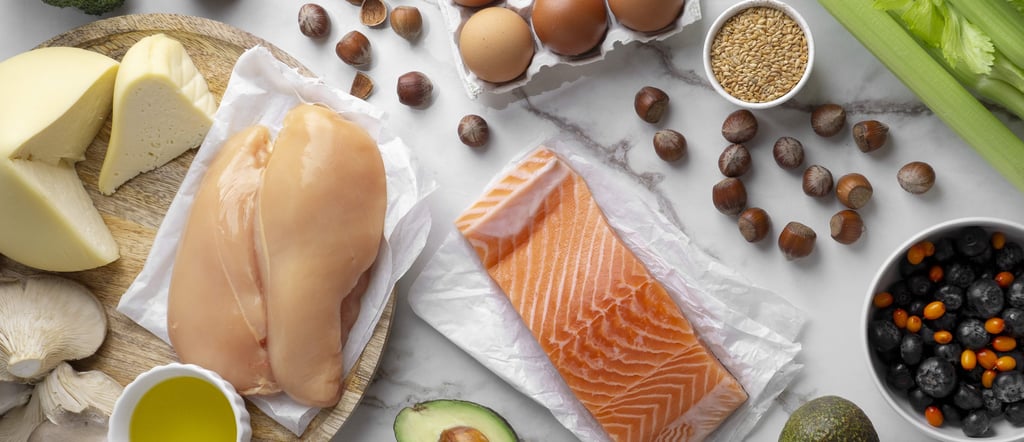

Overview
Collagen, a type of protein that acts as one of the building blocks of our body. From muscles, cartilage, tendons, ligaments, bones, hair and down to skin. Collagen is made up of amino acids-bounded to form a triple helix fiber.
Collagen fibers are not only made by amino acids but also trace minerals such as copper, zinc and manganese are essential in collagen production. Other than that, vitamin C plays are crucial and important role in collagen synthesis too. To learn more on collagen and vitamin C please
Read More: How to Use Vitamin C Serum in Your Skincare Routine for Beautiful Skin
Table of Contents
1.0 Overview
2.0 Types of Collagen Found in the Body
2.1 Fun Facts
4.0 Collagen Benefits for Skin
5.0 Things that Cause Collagen Breakdown
6.0 How to Stimulate Collagen Production Naturally?
7.1 Are Vegan Collagen Better?
8.0 Collagen VS Collagen Peptides
10.0 Takeaway
11.0 Frequently Asked Questions (FAQ)
12.0 References
Types of Collagen Found in the Body
All these body parts are built with some form of collagen. They have found about 28 types of collagen in the human body, collagen type I being more prominent, making about 90% of all collagen found in the body. Collagen types listed below are:
Collagen type I: This type of collagen is abundant in the human body making up to 90% of collagen in human body. It is found in nails, skin and hair.
Collagen type II: This type of collagen is found in cartilage.
Collagen type III: This protein is important in cardiovascular system and organs for working functions of the body. It is also found alongside collagen type I in most of the cases.
Collagen type IV: This type of collagen you can find it in basement membrane like dermo-epidermal junction (DEJ). It can be adversely affected by aging and progressive cancer.
Collagen type V: This collagen type can be found in gastro-intestinal muscles, bone matrix, lungs, liver and placenta.
Other types of collagen can be found with these major collagen types or alongside these types, acting as part of connective tissues. Type collagen I and III are considered best for the skin.
When it comes to skin in particular, collagen provides that structural build to the skin. In fact collagen acts as some form of ‘reinforcement bars’ that prevents the skin from imploding which can be seen as volume loss, skin sagging and other signs of aging that can be noticed.
Both internal and external factors can contribute to collagen depletion such as stress, health issues, genetic factors and overall natural factors. On the other hand, external factors such as pollution and UV exposure from the sun can significantly denature collagen in skin matrix.
FUN FACTS
Collagen make up about 30% of total body protein.
When we reach our 30s we start to lose 1% of collagen per year.
Tanzanite Skincare
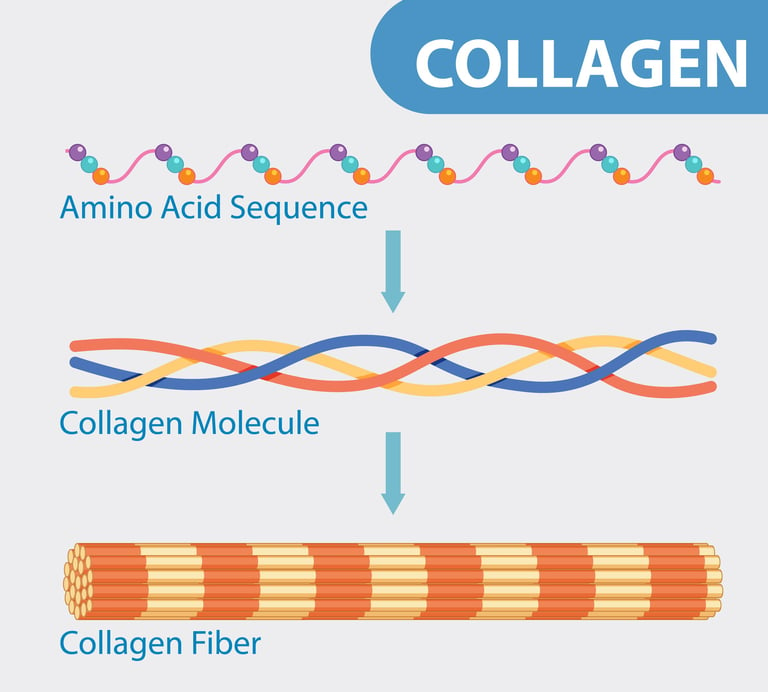

Collagen in Skincare
Collagen has gained popularity in skincare space over the years with a promise to tackle signs of aging by compensating for the lost volume in skin. Collagen skincare products are usually advertised as a miracle skincare active that can smoothen fine lines, wrinkles and bring youthful appearance.
Collagen is found in topical preparations such as moisturizers, lotions, ointments and creams. Oral forms of collagen are also popular like collagen powder, gummies, pills and collagen teas. Also collagen face masks have been on trend nowadays, thanks to K-Beauty skincare.
Collagen Benefits for Skin
Taking collagen orally or applying it topically can improve visible signs of aging and support skin health of an individual. In this article, we’re are going to touch on benefits of collagen and how you can use them to help your skin get that youthful appearance. Here are some of the benefits such as
Reduce fine lines and wrinkles
Boosts skin elasticity
Thicken the skin barrier
Improve skin moisture and hydration
Increase skin volume and plumpness
Strengthen skin barrier
Prevents signs of aging
1. Reduces fine lines and wrinkles
Collagen and collagen peptides can be used to replenish lost collagen due to aging, smoking or pollution. Collagen can be used in form of topicals but don’t get stuck with expensive collagen creams, there other alternatives too.
One study research found out that collagen supplements can help to reduce skin wrinkles in the skin with no side effects.
2. Boost Skin Elasticity
Since collagen acts as connective tissue in the skin’s extracellular matrix. When collagen is denatured through aging you’ll see your skin losing its elasticity and hence cause sagging.
Some studies have found out that orally administering hydrolyzed collagen can significantly skin elasticity.
3. Thicken the Skin Barrier
As you age, your skin gets thinner and thinner due to collagen and volume loss under the skin. To counter-balance this phenomenon, then using collagen supplements can be the solution.
A study done in 12-week period using fish hydrolyzed collagen and MSM have shown improvement in skin’s dermal density, thickness and skin’s texture which is among markers of youthful appearance.
It also been observed in other studies that results from collagen supplementation can be improved if used or mixed with hyaluronic acid, coenzyme Q10, minerals and other antioxidants.
4. Improve Moisture and Hydration
It can help to replenish epidermal hyaluronic acid from proline and hydroxyproline amino acids that are found in collagen and can stimulate fibroblast cells to produce hyaluronic acid.
A study done on mice found out oral administration of collagen showed remarkable improvements in skin hydration compared to placebo group.
Another study, found out that marine collagen peptides to be optimal in terms of bioavailability, efficacy and potency in improving skin hydration. Meanwhile, collagen derived from chicken cartilage was found to improve skin moisturization though more data is needed to clarify these findings.
5. Increase Skin Volume and Plumpness
Collagen can increase lost volume by directly replenishing the connective tissues or stimulating production of epidermal hyaluronic acid and amino acids that can support skin health.
To add on top of that Dr. Jordan Wagner explains, “…and taking collagen supplements may even promote the production of other proteins that help structure your skin, including elastin and fibrillin as well.”
A research study found out that low molecular weight collagen peptide supplementation can improve crow’s feet volume.
6. Strengthen Skin Barrier
As part of any healthy skin barrier, should have abundant amount of collagen. Though aging can reduce collagen in the skin extracellular matrix and make the skin to sag. In order to remain with that youthful firm skin then incorporating collagen topicals or collagen supplements.
In several studies, collagen supplements have shown remarkable results in improving skin’s firmness.
7. Prevent Signs of Aging
Collagen and collagen peptides have gained popularity since they can support slowing down all signs of aging. You can have your collagen in forms of powder, pills, liquid collagen, teas and enjoy having it at any part of your day which makes it easier to incorporate it as part of your diet and skincare routine.
A study observed that after supplementing with collagen, improvement in skin’s texture, elasticity, hydration and firmness significantly improved.
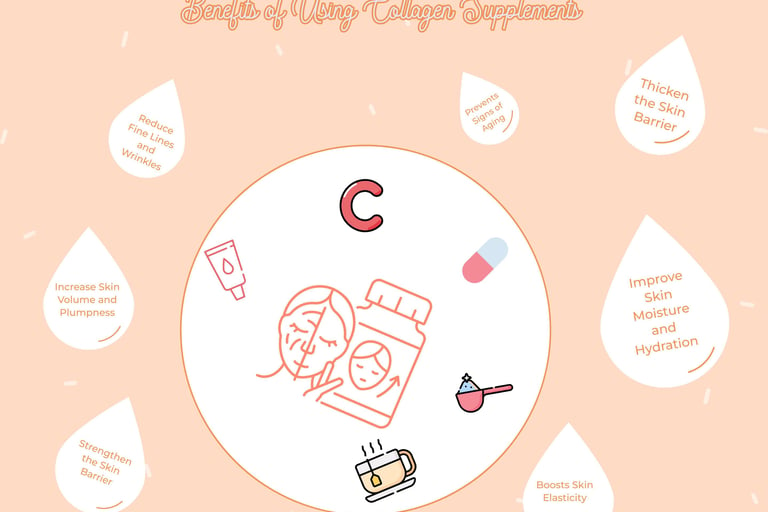

Things that Cause Collagen to Breakdown
1. Natural Aging Process
This is the foremost reason for collagen loss. When we reach in our mid-twenties we start to lose collagen since there occurs a slow down of collagen production, naturally as part of aging. By the time we hit 30 we start to lose 1% collagen each year and notice fine lines and wrinkles on your face appearing.
But as we continue to age to our fifties and sixties the body produces more of an enzyme known as collagenase which actually dissolves the collagen in the skin layer which on the outside is seen as sagging and loose skin.
Photoaging caused by UV exposure from the sun can be one of other primary factor to degrade collagen with no doubt
2. Hormonal Changes
When you’re young growth hormones play a big part in ensuring that supple and plump, neotenous skin. In your teenage years, due to increase of estrogen or testosterone in the body it comes with increase in collagen due to stimulating fibroblasts in the skin.
When women hit menopause and there is low production of estrogen is always followed by low collagen production and collagen loss, this can also be true to older men that experience decrease of testosterone which causes collagen loss. This collagen breakdown can also manifest when there is severe hormonal fluctuations in the body seen on skin as sagging.
3. Excess Sugar Uptake
Eating sugary foods has never been a good idea especially when it comes to your skin health. When there is large intake of sugars like glucose or fructose can cause a process called glycation. In this process, these sugars react with proteins in the skin that is collagen and elastin hence causing their breakdown.
One study found out that excess consumption of sugary foods could cause reactive oxygen stress(ROS) or inflammation. It is therefore advised to cut back on those sugary doughnuts and candies for the sake of your skin.
4. Excess Alcohol Intake
Lifestyle involving drinking alcohol can cause degradation of collagen through inflammation which interfers with collagen production. This can accelerate aging process of the skin which can be seen outside as dry, cracked or sagging skin.
Instead drink lots of water and non-alcoholic beverages that can retain skin hydration and moisture.
5. Smoking and Vaping
Another thing that can breakdown your collagen in skin is smoking and recently vaping. Smoking is not good for your overall health, so is skin health. Chemicals found in the cigars, cigarettes and vape pens can cause collagen breakdown in skin leading to premature aging.
A research study reported that smoking decreases production of collagen I and III which are important in skin health.
6. Stress
High levels of stress and stress-related issues can lead to degradation of collagen. Collagen and elastin fibers give the integrity for the skin to look youthful. Stress can cause your body to produce cortisol that can affect your skin.
A study discovered that stress can affect your skin’s integrity that can lead to collagen degradation.
7. Genetic Factors
Unfortunately, some individuals have genetic disorders that can impact how collagen is produced since genes in charge of synthesizing collagen are mutated. Though these genetic syndromes are rare and won’t affect large population.
Rare genetic disorders were discovered to be caused by gene mutations in genes COL1A1 and COL1A2 affecting the collagen type I in the skin
How to Stimulate Collagen Production Naturally?
Here are few things that you can do that are simple and can really help your skin produce or protect your skin from collagen degradation. These things are
Eat a well-balanced diet: Include citrus and beta-carotene foods such as oranges, tangerines, kiwi, carrots, legumes and leafy greens vegetables like kale, spinach and lettuce.
Protect your skin from photoaging: Here you can use topical sun protection such as sunscreens 30++SPF or sunblock 50++SPF (Sun Protection Factor) that covers broad spectrum of UVA and UVB rays.
But also you can use physical barriers like clothes or full-on face mask or go ‘beekeeper mode’ with wide brimmed hats with a muslin. These things can protect the collagen from degrading.
Avoid sugary foods: It cannot be over-emphasized that glucose coming from ultra-processed foods and carbs can cause inflammation in the skin by reacting with proteins including collagen.
So, instead of eating processed junk foods swipe them for delicious healthy snacks and home cooked meals. Also favor foods that are cooked by steaming, boiling or baking since they produce less free radicals that can damage collagen.
Avoid smoking and vaping: As widely known smoking and recently vaping are unhealthy habits that can destroy collagen and cause premature aging. Talk to your doctor or therapist on how you can quit these habits and replace them with healthier more fulfilling, productive habits.
Try non-invasive skincare procedures: When you see fit or in good place to afford a visit to an aesthetician or dermatologist to get procedures that can stimulate collagen production such as laser resurfacing RF(radio-frequency) micro needling, and chemical peels.
Lastly, consistent skincare routine: To stimulate collagen production find a simple skincare routine that you can follow religiously everyday. For beginners, stay away from 7 or 10 step skincare routines since they can discourage you from continuing doing them.
Dr. Karam says, “ …the three categories , retinol, vitamin C and growth factors that are working directly at the genetic level and stimulate collagen…”
Find skincare products that have multi active ingredients such as vitamin C, niacinamide and peptides. Some of the skincare products are
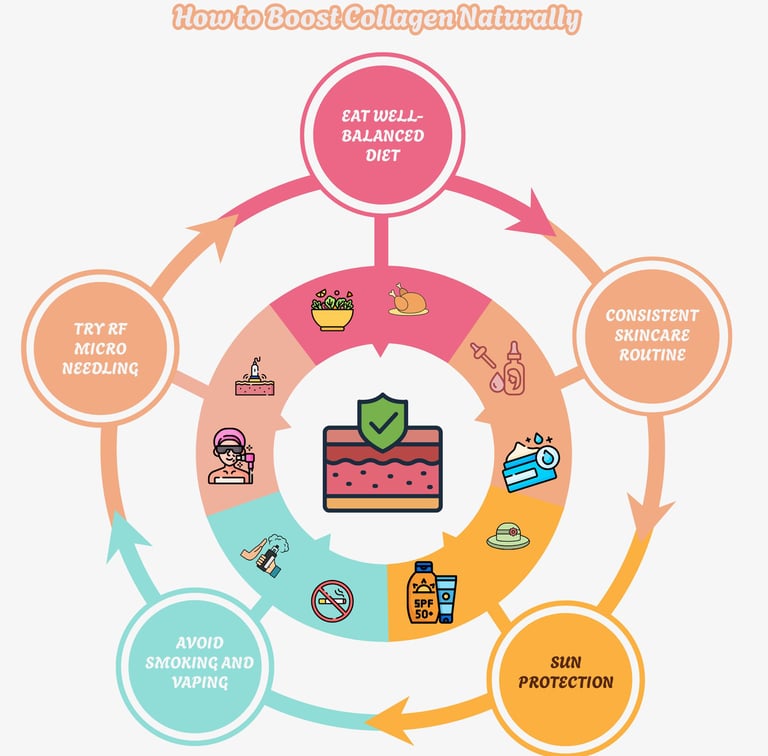

Collagen Rich Foods
Many sources of collagen are found in animal-based foods such as broth from fish bones or bovine bones. Types of collagen are
Bovine collagen: Bovine stands for cows or cattle and products coming from their meat and bones. This is the best source of natural collagen so far. Bone broth from cow bones can provide collagen. Bone broth is made by boiling cow bones, ligaments and tendons for hours then obtaining the broth to be drunk.
When looking for collagen supplements, bovine collagen or collagen peptides from animal-based sources be selective and careful to avoid them if you’re allergic to animal products.
Marine collagen: This type of collagen comes from fish bones, seashells like oysters and scales. Fish bones can be simmered for several hours to get fish broth that can be a good source of collagen. Though you should know that fish sources are more likely to contain mercury poisoning and microplastics, so it should not be consumed on daily bases.
Other sources of collagen from poultry, porcine and other animals are
Eggs
Chicken broth
Chicken skin
Pork and pork skin
Beef
Mutton
Gelatin
Are Vegan Collagen Better?
There are no direct sources of collagen or collagen peptides from plants. Though many brands that claim to sell ‘vegan’ collagen powder or peptides though what they do is take amino acid components of collagen like proline, glycine and hydroxyproline which may come from plant or synthetically made.
Here is an expert, Dr. Youn had to say about vegan collagen, “Unfortunately, collagen supplements cannot be vegan, collagen only comes in animals not plants however if you go to a health food store and you look for a vegan collagen supplement you’ll find them…”
He added, “…most collagen supplements contain combination of amino acids which can be used to build collagen…there are no specific studies on vegan collagen to show that they can improve the skin.”
Another expert Dr. Linkov, warned, “Collagen is exclusively an animal product so there’s no such thing as a vegan collagen supplements so beware of claims that state otherwise…”
Instead, many plant sources could act as collagen boosters, some of rich sources are
Beta-carotene containing foods; carrots, cantaloupe, tomatoes, vegetables like spinach, broccoli, lettuce or winter squash
Citrus fruits like oranges, lemons, kiwi lemons, yuzu
Manganese or zinc containing foods such as pecans, oatmeal, hazelnuts, cashews and chickpeas
Though there are other numerous foods that you can get collagen, having a well-balanced diet can deliver the goal of collagen uptake but sadly it is usually underestimated.
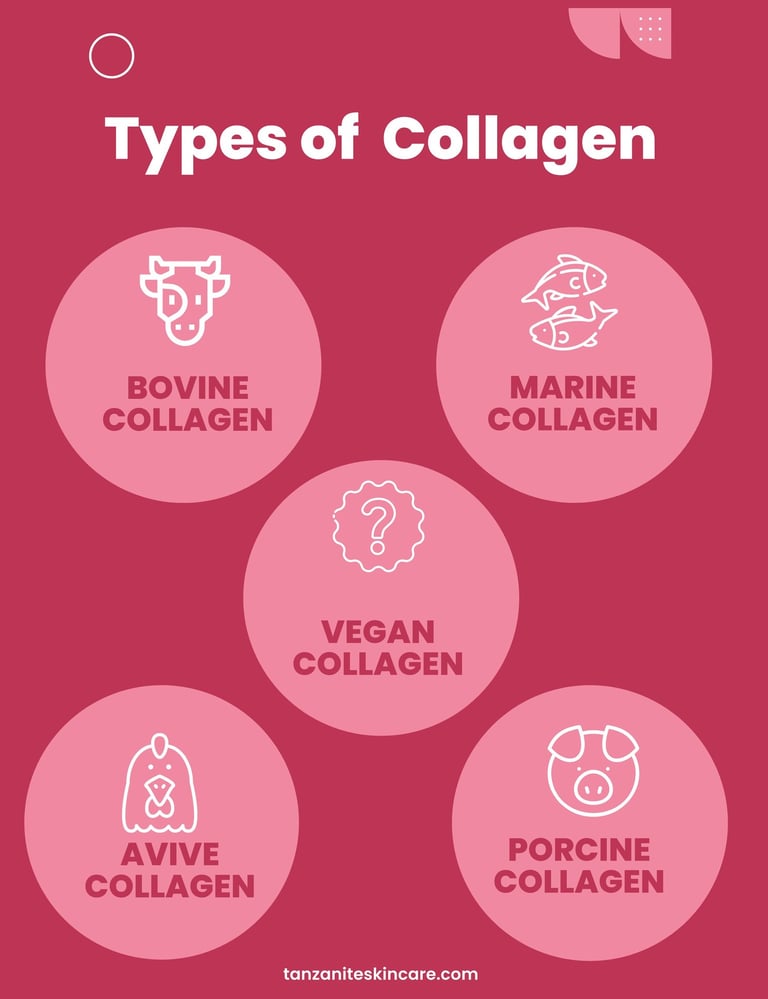

What is the difference between collagen and collagen peptides (hydrolyzed collagen)?
Before, addressing collagen supplements let's know few differences here. Collagen is the whole protein in large chunks of polypeptides while collagen peptides or hydrolyzed collagen is a type of collagen that is broken down through hydrolysis process.
Hydrolyzed collagen or collagen peptides can be easily absorbed by the body than non-broken collagen. Hydrolyzed collagen has molecular size of 3 to 6KDa while the macro-protein collagen ranges from 285 to 3 KDa.
Dr Stefani Kappel emphasized on hydrolyzed collagen, “ …what we do know is that hydrolyzed collagen peptides work better than just ingesting meat or protein… bone broth because you need the key amino acids the hydroxyproline, proline and glycine to increase collagen synthesis…. You want it to be hydrolyzed [collagen], you want it to be devoid of any metals or toxins…”
Collagen Supplements
There are varieties of collagen supplements out there from collagen powders, pills, capsules, teas that promise replenishing collagen lost from aging process. Collagen or collagen peptides from animal sources is best but also comes with expensive price tag.
What is the number one(#1) collagen supplement?
Overall, just look for a reputable, approved by health authorities and clinically tested brand with no heavy metals or toxic residues in it that can be harmful to health. Though you have to remember supplements are not FDA approved so, don’t find low quality brand, you’ll have to spend a little bit more when buying collagen supplements from reputable brands.
Dr. Sam Ellis, shares her advice, “I would look for, when picking out or choosing an oral collagen supplement is whether or not it has a third party certification meaning that a different unrelated group has tested that collagen to really prove that what’s in the supplement…”
There are many brands out there some will be listed to check them out if interested like:
NOW Supplements Multi Collagen Protein I, II & III
Procaps Marine Collagen Peptides
OLLY Glowing Skin Collagen Gummy
Osavi Advanced Collagen Peptides Hydrolyzed Type 1 & 3
Vital Proteins Beauty Collagen Powder
Always look for brands containing collagen I and III when it comes to skin since they’re more important than other collagen types when it comes to skincare. Another thing is that marine collagen reigns superior when it comes to skin hydration.
So, what is the recommended amount of collagen per day?
You can take collagen powder or pills within the range of 2.5 to 15 grams but some individuals can tolerate up to 20 grams of collagen per day with no side effects.
You can add your collagen in foods such as coffee, teas or smoothies and drink it since collagen on its own has no sweet taste. Collagen can be supplements before or in-between meals.
Is there a downside to taking collagen supplements?
There are no direct risks that have been assessed when it comes to supplementing with collagen though more findings and discoveries need to be made on efficacy of collagen on long-term basis.
Who should not take collagen supplements?
As said before, collagen is a well-tolerated supplement though people with kidney issues are advised to talk with their doctor or healthcare provider before using them. People with food allergies should be cautious when selecting brands to use in their collagen supplementing.
Are collagen supplements safe for pregnant or breastfeeding individuals?
There is no clear path on this, and if you’re pregnant or breastfeeding, it is always advised to talk to your doctor or healthcare provider before including a supplement in your diet. You can check if you have any allergies to animal-based foods since collagen mostly are derived from animals, beforehand.
An expert, Dr. Dray gives a point here saying, “…we don’t have any research looking at collagen supplements in pregnancy or in breastfeeding, so we don’t know if collagen supplements are safe for who are pregnant or breastfeeding now…”
Can collagen be absorbed by the skin?
There are currently no direct evidence of collagen to be absorbed by the skin. So, skip those expensive branded collagen creams, lotions and moisturizers that can’t be absorbed but just end up sitting on the skin and don’t penetrate the skin.
Despite numerous campaigns on collagen skincare products, save your cash to buy collagen supplements, do not be deceived.
Takeaway
Despite of all the hype, popularity and anecdotal claims going around online, collagen and its support to skin health should not be exaggerated. It is not a miracle drug or elixir that can turn the clock backwards in matter of days, weeks or months.
There is still more studies that are needed to be done with larger, diversified group of subjects at a longer period of time to substantiate these claims. Generally, collagen is considered safe to ingest and can be tolerated by most individuals with no to little mild effects like stomach upset or diarrhoea. Otherwise collagen is a promising and good addition to your skincare regimen.
Frequently asked questions
When collagen should be taken?
Collagen can be taken at any time of the day, morning, afternoon and evening. You can take it on empty stomach or mix in coffee or smoothies. You can take it in before or after meals or evening for a good quality sleep. Look for any contraindication if you're taking other drugs too.
How collagen is made/manufactured?
Collagen used in supplements are made following these steps. Sourcing out raw materials (animal-based), extracting, hydrolysis, purification and adding preservatives or active ingredients. It is then labelled and packaged.
Can collagen cause acne?
Collagen on its own, can not cause acne. Acne can be a result of allergic reactions from marine, porcine or bovine collagen sources. Another thing can be preservatives or active ingredients alongside collagen. Check out any ingredient that may trigger allergic reactions on the ingredient list.
Are collagen face masks good for skin?
Collagen face masks can not help your skin health when applied on skin by any means. Collagen is made up of large-sized molecules that sit on the skin and can't penetrate the skin barrier. Skip hyped K-Beauty collagen face masks for AHA, BHA and PHA face masks for brighter, youthful face.
References
Szu-Yu Pu, et al. (2023). Effects of Oral Collagen for Skin Anti-Aging: A Systematic Review and Meta-Analysis. https://pmc.ncbi.nlm.nih.gov/articles/PMC10180699/
Roseane B de Miranda, et al. (2021). Effects of hydrolyzed collagen supplementation on skin aging: a systematic review and meta-analysis. https://pubmed.ncbi.nlm.nih.gov/33742704/
Liane Bolke, et al. (2019). A Collagen Supplement Improves Skin Hydration, Elasticity, Roughness, and Density: Results of a Randomized, Placebo-Controlled, Blind Study. https://www.mdpi.com/2072-6643/11/10/2494
Naoki Inoue, et al. (2016). Ingestion of bioactive collagen hydrolysates enhance facial skin moisture and elasticity and reduce facial ageing signs in a randomised double-blind placebo-controlled clinical study. https://pubmed.ncbi.nlm.nih.gov/26840887/
Arely Leon Lopez, et al. (2019). Hydrolyzed Collagen—Sources and Applications. https://pmc.ncbi.nlm.nih.gov/articles/PMC6891674/#sec2-molecules-24-04031
Natalia Dolata, et al. (2024). The Impact of Excessive Sugar Consumption on Skin Health Analysis of Biological Mechanisms and Dermatological Effects.
Yanqin Lu, et al. (2019). Molecular mechanisms and clinical manifestations of rare genetic disorders associated with type I collagen. https://pmc.ncbi.nlm.nih.gov/articles/PMC6557237/#sec3
Juan Antonio Carrillo-Norte, et al. (2024). Anti-Aging Effects of Low-Molecular-Weight Collagen Peptide Supplementation on Facial Wrinkles and Skin Hydration: Outcomes from a Six-Week Randomized, Double-Blind, Placebo-Controlled Trial. https://www.mdpi.com/2079-9284/11/4/137
Zoe Diana Draelos, et al. (2024). INDIVIDUAL ARTICLE: Sugar Sag: What Is Skin Glycation and How Do You Combat It?. https://pubmed.ncbi.nlm.nih.gov/38564405/
H P Nguyen, et al. (2015). Sugar Sag: Glycation and the Role of Diet in Aging Skin. https://pubmed.ncbi.nlm.nih.gov/27224842/
